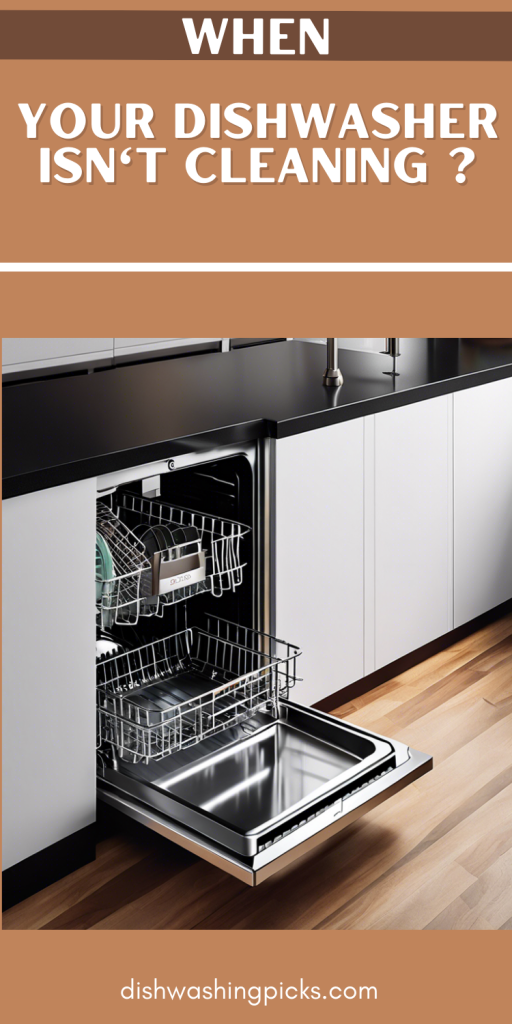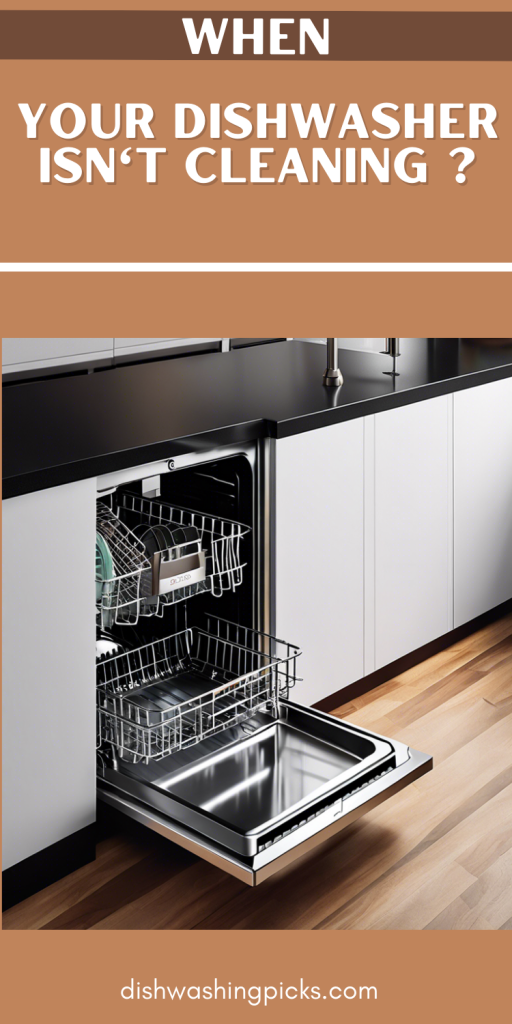
Alright, let’s be real for a second—nothing’s more frustrating than loading up your dishwasher, pressing “start,” and then opening it up to find a half-clean disaster. The plates are still covered in food, the glasses look cloudy, and you’re left wondering, “What in the world happened?”
It’s like, you trust your dishwasher to do the heavy lifting, but now it’s acting like it’s on strike. We’ve all been there, and it’s seriously annoying. But don’t worry, before you start swearing off technology and pulling out the sponge, let’s figure out why your dishwasher might be slacking off and what you can do to get it back to its full glory.
Why Is My Dishwasher Not Cleaning? Let’s Break It Down
You’re probably thinking, “Okay, so what’s going on here? Why is my dishwasher suddenly failing me?” Well, it could be a few things, but don’t stress! We’ll walk through the most common culprits, and I bet you’ll be back to clean dishes in no time.
1. Clogged Spray Arms
Okay, imagine you’re trying to wash your car with a hose that has a kink in it. Not much water’s getting through, right? Same goes for your dishwasher. If the spray arms are clogged—whether from food debris, mineral buildup, or just old gunk—it can mess with the water flow, making it harder to clean your dishes properly.
Fixing it’s super easy though. All you need to do is check the spray arms, and if you spot any blockages, clean them out. A good rinse with warm water or a quick scrub with a toothpick will do wonders. It’s a quick fix that can make a huge difference.
2. Dirty Filters
Now, don’t hate on your dishwasher’s filters—they’re just doing their job! But over time, they can get clogged with food particles, grease, and soap residue. If that happens, they’re not going to do their job as well, leaving you with dirty dishes.
Here’s the thing: cleaning filters is probably one of the most overlooked chores. It’s one of those “out of sight, out of mind” deals, but trust me, it’s worth the effort. Pull out the filter, rinse it under some hot water, and scrub away any stubborn buildup. You’ll be surprised how much gunk can accumulate in there.
3. Too Much Detergent (Or Not Enough)
You know that feeling when you go a little overboard with the soap and end up with a sink full of bubbles? Well, that can happen in your dishwasher too, but in a slightly different way. Using too much detergent can leave a nasty residue on your dishes, while using too little might mean your dishes aren’t getting clean at all. It’s all about finding that sweet spot.
So what can you do? First, double-check the detergent you’re using. Are you using the right type for your machine? And make sure you’re not overloading it. Less is sometimes more, so stick to the recommended amount.
4. Poor Loading Technique
This one’s a bit tricky because you probably already think you’ve got the “perfect loading technique” down. But let’s be honest: we’ve all thrown things in there, packed it like it’s a game of Tetris, and hoped for the best. The truth is, how you load your dishwasher makes a big difference.
Imagine trying to clean a dirty pot with a towel stuffed inside it. Not going to happen, right? Same with your dishwasher. If there’s too much stuff crammed in or the spray arms can’t rotate freely, you’re just setting your machine up for failure.
Here’s a quick tip: load larger items on the bottom rack, smaller items on top, and make sure nothing is blocking the spray arms. If you give your dishwasher a little space to work with, it’ll clean way more effectively.
5. Hard Water Build-Up
This one’s a little sneaky—hard water can cause all kinds of problems without you even realizing it. Over time, hard water deposits can build up inside your dishwasher, clogging the spray arms, leaving mineral stains on your glasses, and generally making a mess of things.
What can you do about it? The easiest fix is to run an empty cycle with a cup of white vinegar placed in the bottom. That’ll help break down some of the build-up. You can also get a dishwasher cleaner designed specifically for hard water. Your glasses will thank you.
6. Run Regular Maintenance Cycles
Okay, this one’s simple but super effective: think of your dishwasher like a car. You wouldn’t drive it without regular check-ups, right? The same goes for your dishwasher. Running a maintenance cycle every few months (with dishwasher cleaner or white vinegar) can help keep everything fresh and working smoothly.
It doesn’t take long—just run a cycle with no dishes in it, and you’ll help break down mineral deposits, food bits, and soap scum that might be causing issues.
7. Check the Water Temperature
Your dishwasher needs hot water to do its job. If the water’s not hot enough, it’s not going to clean properly. Most dishwashers work best with water around 120°F (49°C). So, if you’re getting cold water, or the water just doesn’t feel hot enough, it’s worth checking your water heater to make sure it’s cranking out the heat you need.
8. Don’t Overload It
It’s tempting, I know—throwing everything in there just to get it all done. But overloading your dishwasher can actually work against you. When everything’s too packed in, the water and soap can’t reach all the surfaces, which means your dishes won’t get fully cleaned.
So, maybe ease up on cramming it to the brim and give your dishwasher a little breathing room. You’ll get better results, and your dishes will thank you.
9. Fix Any Leaks Right Away
If your dishwasher is leaking, it’s time to address it, stat. A small leak can mess with the water pressure and even lead to bigger issues like mold or water damage. Check the door seals and hoses regularly for leaks or cracks. If you spot anything, it might be worth getting a pro to come out and take a look.
Don’t Let a Dirty Dishwasher Ruin Your Day
At the end of the day, dishwashers are meant to make life easier, not harder. If yours isn’t doing its job, there’s usually a simple fix—whether it’s cleaning the filters, adjusting how you load your dishes, or running a maintenance cycle. Don’t let it stress you out too much. A little troubleshooting and regular care can bring your dishwasher back to life.
Next time you open that dishwasher, you’ll be greeted with perfectly clean dishes instead of the dreaded “uh-oh” moment. So, go ahead and tackle the issues, and if you’ve got any other tips to share or questions, drop them below. We’re all in this dishwashing journey together!
There you have it—everything you need to know when your dishwasher isn’t cleaning properly. From clogged spray arms to overloaded racks, most issues are pretty simple to fix, and a little maintenance goes a long way. Just remember, your dishwasher’s there to make life easier, so if it’s giving you trouble, there’s almost always a way to get it back in shape.
Don’t sweat the small stuff—take a few minutes, follow these tips, and you’ll have your dishwasher working like new in no time. And hey, if you’ve got any other tricks up your sleeve or questions that popped up while reading, don’t be shy—drop them in the comments below. Let’s keep this dishwashing hack game strong!
Happy dishwashing!

